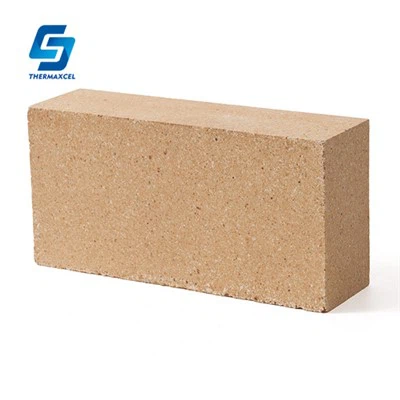Si3N4-SiC bricks materials are specifically designed to withstand extreme thermal cycling, corrosive atmospheres, and mechanical abrasion, making them ideal for applications where conventional refractories fail. The bricks maintain structural integrity at temperatures up to 1650°C (3000°F) and exhibit minimal thermal expansion, ensuring long-term reliability in furnace linings, kiln furniture, and other high-heat applications.these bricks offer thermal conductivity, mechanical strength, and chemical stability.
Product Parameters
|
Brand Properties |
NSIC80 |
|
|
Bulk Density (g/cm3) |
2.65 |
|
|
Apparent Porosity (%) |
16 |
|
|
Cold Crushing Strength (MPa) |
130 |
|
|
@0.2MPa Refractoriness Under Load (℃) |
1700 |
|
|
Thermal conductivity (W/m.k) |
18 |
|
|
(%) Chemical Analysis |
SiC |
76 |
|
Si3N4 |
20 |
|
|
Fe2O3 |
0.3 |
|
Product Usage:
In the aluminum smelting industry, Silicon carbide bonded silicon nitride bricks serve as critical linings for electrolytic cells, offering exceptional resistance to molten aluminum and fluoride-containing electrolytes. Their high thermal conductivity ensures uniform heat distribution, while their corrosion resistance minimizes premature wear.
In steel and foundry applications, Si3N4-SiC bricks are employed in blast furnace linings, tundishes, and ladles, where they withstand molten iron and slag erosion. The ceramics and glass industries utilize these bricks in kiln car furniture, saggers, and burner nozzles due to their ability to maintain dimensional stability under repeated heating and cooling cycles.
Product Advantages
High Mechanical Strength
Cold crushing strength exceeding 120 MPa, ensuring structural stability under heavy loads.
Thermal Shock Resistance
Capable of withstanding rapid temperature fluctuations without cracking, making them ideal for intermittent furnace operations.
Excellent Abrasion Resistance
Silicon carbide's inherent hardness (Mohs 9.5) minimizes wear in high-velocity gas or particle flow applications.
Low Thermal Expansion
Coefficient of thermal expansion (CTE) of 4.2 × 10⁻⁶/°C, reducing stress buildup during heating cycles.
Oxidation Resistance
The silicon nitride bonding phase forms a protective SiO2 layer at high temperatures, preventing degradation in oxidizing atmospheres.
High Strength and Stability
high compressive strength and load-softening temperature, provide support in demanding conditions.
Product technology:
The production of silicon carbide bonded silicon nitride bricks involves a carefully controlled process to ensure optimal microstructure and performance.

Key steps include:
High-purity silicon carbide powder (96-99% SiC) is mixed with metallic silicon and organic binders before being pressed into shapes using isostatic or hydraulic pressing techniques.
The green bricks then undergo nitridation firing at 1400-1500°C in a nitrogen-rich atmosphere, where silicon reacts with nitrogen to form silicon nitride (Si3N4), creating a strong, interlocking bond between SiC grains.
Why Choose Us?

23+
years experience focus on refractories field

2 plants
with 3 sets of tunnel kilns for 120,000 tonnes capacity

3 QC
Labs Technology Centres

120+ employees
with ISO9001,TUV,SGS,Intertek certifications

100+
abroad customers in 50+ countries

20+
major industry furnace projects yearly
Packing
To guarantee product integrity during transit, our Si3N4-SiC bricks are packed using heavy-duty wooden crates with foam cushioning to prevent chipping or breakage.
For international clients, we offer custom packaging solutions, including moisture-resistant wrapping for sea freight and shock-absorbent designs for delicate shapes.

FAQ
Hot Tags: silicon carbide bonded silicon nitride bricks, China silicon carbide bonded silicon nitride bricks manufacturers, suppliers, factory, AZS Bricks, Ceramic Fiber Heaters, Calcium Silicate Board, Fireclay Bricks, Alumina Ceramic Crucible, Magnesia Carbon Bricks






